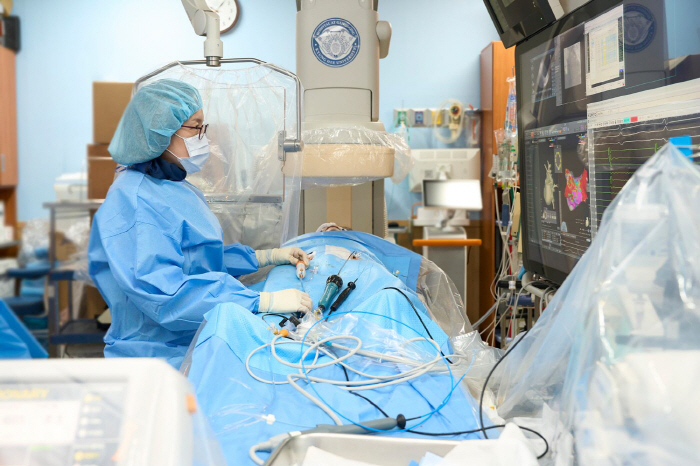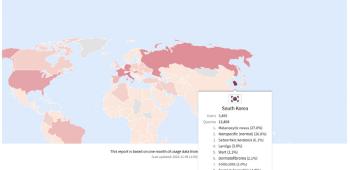Stroke-induced atrial fibrillation more than doubled in 10 years...Attention to electric field procedures
Aug 11, 2025
|
The prevalence rate in Korea has more than doubled in the past 10 years due to the aging population.
Meanwhile, recently 'Pulse bowel resection (PFA)' is attracting attention as a new treatment.
Gangdong Kyunghee University Hospital also introduced a 'Pulse failed ablation (PFA)' system that attracts attention for its short procedure time and low complications and has begun full-fledged treatment.
◇ Arrhythmia rapidly increasing due to aging 'Atrial fibrillation'…It also causes cerebral infarction
Atrial fibrillation is one of the common arrhythmia diseases, characterized by the sudden and irregular shaking of the heart.
It is one of the diseases that is rapidly increasing with the aging population as it is related to aging.
The prevalence of atrial fibrillation reached 2.2% of the population in 2022, more than doubling compared to 10 years ago, according to the Korean Atrial fibrillation Fact Sheet. In particular, it is 3.0% in the 60s, 6.8% in the 70s, and 12.9% in the 80s and older.
Atrial fibrillation can decrease the pump function of the heart, causing or worsening heart failure, and can more than double the mortality rate from heart disease. Above all, it is even more dangerous because it can lead to cerebral infarction. When atrial fibrillation occurs, blood clots are formed in the atrium as the atrium trembles finely and blood cannot flow properly, causing a stroke when the blood clots move along the bloodstream and block blood vessels in the brain. In fact, patients with atrial fibrillation have five times higher risk of stroke than the general population.
◇Initial 'Anticoagulant' medication, if it gets worse, consider the procedure
Early diagnosis and treatment are important because atrial fibrillation can affect both the heart and brain.
It is usually diagnosed by electrocardiogram. Persistent atrial fibrillation, which persists throughout the day, is easily diagnosed by electrocardiogram, but paroxysmal atrial fibrillation, which sometimes appears, is diagnosed by a daily electrocardiogram that records an electrocardiogram for a long time. Initial symptoms may include palpitations, chest tightness, breathlessness, and helplessness, and there are many cases where there are no symptoms at all. Even if it's small, if you feel symptoms, it's a good idea to visit a hospital and consult a specialist.
The basic treatment of atrial fibrillation is medication and procedural treatment, including anticoagulant treatment. Scores are scored by referring to whether there is a comorbid disease such as diabetes or high blood pressure, age, and history of cerebral infarction, and if it is judged that there is a high risk of blood clots beyond the standard, the drug is prescribed. Treatment may be performed if atrial fibrillation is not controlled even with sufficient drug treatment, or if drug treatment is not possible due to side effects or bradycardia.
◇ Existing procedures, some complications risk...Attention 'Pulse bowel resection'
Previously, 'high frequency electrode catheter ablation' and 'Cryo balloon ablation' were performed the most. Both procedures treat arrhythmia by burning or cooling the heart tissue where arrhythmia occurs using high temperature (high frequency energy) or low temperature (cooling energy). However, there have been some cases where high fever or cooling energy affects tissues outside the heart, resulting in complications such as esophageal damage, pulmonary venous stenosis, and nerve damage.
The recently introduced Pulse Field Ablation (PFA) is a new treatment that complements the shortcomings of existing procedures.
It selectively destroys only heart tissue using a high-intensity electric field, and has little effect on surrounding tissue. The procedure time is shortened by more than half compared to the existing procedure, and there is little damage to surrounding organs such as esophagus and nerves because heat and cold energy are not used. There is little pain after the procedure and the recovery speed is fast. It is already actively used in the United States and Europe, and was introduced in Korea early this year. Due to the short procedure time and high safety, its use is gradually expanding.
Cardiovascular internal medicine at Gangdong Kyunghee University Hospital is currently operating all pulse bowel resection models introduced in Korea. The advantage is that the waiting period is shorter and the patient burden is lower than the existing procedure. Professor Eun-sun Jin of Cardiovascular Medicine emphasized that "Pulse bowel resection can only precisely remove heart tissue, so recovery is fast after the procedure and the risk of complications is low" If you receive accurate diagnosis early and appropriate treatment, you can sufficiently prevent progression to stroke and heart failure.'
◇No smoking this week is basic...If your heart is pounding, the test is important
Alcohol is very famous for adversely affecting heart health, especially heavy drinking can cause direct atrial fibrillation.
It is more important to reduce or quit drinking than any other treatment. Tobacco can not only have a negative effect, but it is also beneficial to your health, so it is actively recommended to quit smoking. Above all, it is important to get tested unconditionally without worrying about symptoms of heart palpitations. This is because you need to know exactly what your disease is to receive proper treatment.
|
This article was translated by Naver AI translator.















